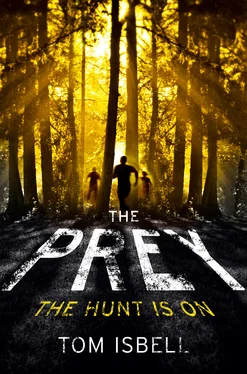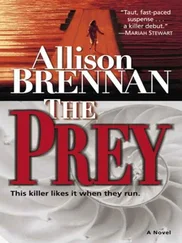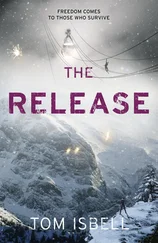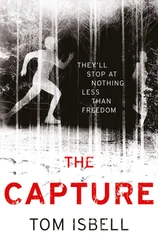But when I held it against my shirt, I saw it matched the ones on my camp uniform. There had to be a lot of shirts out there with white buttons, but still …
From across the fields I heard the sounds of Brown Shirts leaving a party. I had to get out of there before they discovered me.
I let the flashlight’s yellow circle guide me across the court. Metal caught light and glimmered back at me. A brass ring, set flush into the court. I let the light play on the surrounding area … and nearly lost my breath.
A rectangle was cut into the court, like a storm cellar door. Without thinking, I slipped my fingers beneath the cold metal ring and lifted. The door swung up, revealing a black chasm …
… and the reeking stench of BO, vomit, and urine. It nearly made me gag.
I poked the flashlight’s beam into the hole, where it caught a ladder and black concrete walls. It was some kind of underground bunker. Then the light fell on pale, upturned faces—prisoners chained to walls. Their eyes were wide with terror; rags protruded from their mouths. They recoiled at the light, blinking and pressing themselves against the wall like vampires.
I started to move the light away when suddenly I recognized one of the faces. It was Moon, a round-faced LT who’d gone through the Rite earlier that spring. Now here he was, tethered to a bunker wall, unwashed hair plastering his forehead, his pants stained and soiled.
“Moon?” I asked, kneeling by the side of the hole. He squinted into the beam. “It’s me: Book.”
“Aagk?” he sputtered through the gag in his mouth.
My flashlight swung to the prisoner next to him. His face was jaundiced, eyes bloodshot, sores covering his half-naked body. I recognized him, too: Double Wide. And next to him was Beanie. And there was Pill Boy. And Towhead and One Eye and all the other LTs who’d just gone through the Rite.
Why were they here? Weren’t they supposed to be officers somewhere else? It didn’t make any sense.
Unless Cat was right: we were nothing more than prey—raised in a hatchery for someone else’s sport.
I tried to speak but nothing came out. No words, not even sounds. What could I possibly say to ease their pain?
My eyes squeezed shut and the images returned. Dripping crimson on a tiled floor. The press of darkness. Shortness of breath.
Raucous laughter broke the spell; Brown Shirts were approaching. I lowered the door back in place and hurried away, praying I hadn’t been spotted. As I hustled back to the Quonset hut, my mind refused to let go of what I’d just seen. It was like K2’s death: I knew if I didn’t do something—soon—those faces would haunt me the rest of my life.
14. Chapter 14 Chapter 15 Chapter 16 Chapter 17 Chapter 18 Chapter 19 Part Two: Escape Chapter 20 Chapter 21 Chapter 22 Chapter 23 Chapter 24 Chapter 25 Chapter 26 Chapter 27 Chapter 28 Chapter 29 Chapter 30 Chapter 31 Chapter 32 Chapter 33 Chapter 34 Chapter 35 Chapter 36 Chapter 37 Chapter 38 Chapter 39 Chapter 40 Chapter 41 Chapter 42 Part Three: Prey Chapter 43 Chapter 44 Chapter 45 Chapter 46 Chapter 47 Chapter 48 Chapter 49 Chapter 50 Chapter 51 Chapter 52 Chapter 53 Acknowledgments About the Author About the Publisher
EACH ROLL CALL IS the same: names are called in groups of two. Sometimes four, sometimes six. Always in pairs.
This morning, only two names are called. Jane F-738 and Jane F-739.
Faith and Hope.
While the others rush gratefully back to the barracks, Faith and Hope stand alone in the middle of the parade ground. Hope feels her legs go wobbly. A glance at her sister tells her she’s in a kind of shock, the blood draining from her face.
“Coming, girls?” Dr. Gallingham asks, dabbing his watery eyes with a soiled hanky.
Although it’s no more than a hundred yards to the infirmary, it feels like a hundred miles, each step worse than the one before. Hope hears a rattling sound and realizes with a start that it’s Faith. Her teeth are chattering as though it were the dead of winter, even though it’s a warm spring morning, sunlight stroking their faces.
“H and FT,” Hope whispers.
Faith doesn’t seem to hear. She shuffles forward like a sheep to slaughter.
Hope can’t take it. First there was her father’s death, then their capture. Now this. Any moment she expects to wake up from this nightmare.
The infirmary stands two stories high, with peeling white paint and bars covering the second-floor windows. Like a prison … or an insane asylum.
Dr. Gallingham leads them into a front reception area. A Brown Shirt tugs a key from his key ring and unlocks a door. Faith shakes uncontrollably as they’re herded upstairs. Before them lies a long hallway. White-coated technicians hurry from one room to the next.
Hope glances into one of the rooms and sees a dead girl lying motionless on a stainless steel table, her lifeless eyes boring into the ceiling. A man in a white coat slices through her chalky skin with a scalpel, removing organs and plopping them in a bowl. In the next room, another man is powering up a portable handsaw, preparing to cut through a corpse’s clavicle. Hope hears but does not see the scrape of metal biting into bone. The smell is like burning hair.
“Eyes forward,” Hope commands her sister, trying to spare her.
The two girls are led into a small room near the end of the hall. Water stains tattoo the ceiling. Before them are two beds, the white iron splotched with rust. Dr. Gallingham makes a grand motion with his damp hanky, indicating the girls should lie down.
“Good,” Hope says. “I wanted to take a nap.”
“And if you’re lucky,” Gallingham responds, “you might even wake up.”
As soon as they’re horizontal, two middle-aged female technicians begin attaching leather manacles to their wrists and ankles.
“What’s this?” Hope asks, fighting against the straps. “Think we’re gonna run away?”
“You’d be surprised.”
At just that moment, the techs hold up syringes and tap the plastic cylinders. Small bubbles of hazy liquid dribble from each needle’s end.
“Now then,” Dr. Gallingham says cheerily, “is everyone ready to serve the Republic?”
“Just take me,” Hope blurts out. “Leave my sister alone.”
The doctor shakes his head. “You’re missing the point. We need both of you. You have the same genetic makeup, so you’re perfect for evaluating our drugs. You can help us determine which ones work”—he pauses dramatically—“and which ones don’t.”
“But we’re not sick,” Hope says.
Gallingham’s thin lips part in a hideous smile. “Not yet.”
One of the techs passes him a syringe, and before Hope can say anything else she feels the prick of the needle as it penetrates skin. Dr. Gallingham’s fat thumb pushes against the syringe’s plunger. “Good to the last drop,” he says with a chuckle.
Hope doesn’t know if it’s her imagination, but she swears she can feel the poisons invading her bloodstream, spreading up her arm, her chest, racing through her entire body.
“What if it kills us?” she asks.
“That’s why we have vaccines.”
“What if they don’t work?”
“Why do you think there are so many singles running around?”
Hope finally understands: the haunted expressions, the lack of trust, the sense of despair. The girls all came here as twins. Thanks to Dr. Gallingham, many are now sister-less. Exactly what her father was warning her about.
“Finally get it, do you?” Gallingham asks.
As Hope tugs at the leather manacles, a wave of nausea rolls through her. Whatever they’ve been given works fast.
“We’ll be back later,” the doctor says in a cheery tone. “Sleep tight.”
Читать дальше












